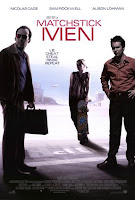What to do if you're a skeptic by temperament, but the popular culture prefers 'conversion narratives' that move from skepticism to belief, rather than the other way around? PZ has a good discussion of that here. Bronze Dog chimes in with a novel scenario here. The initial thread was inspired by an observation by science journalist Chris Mooney. Me? I think it has to do with a real clash between the expectations of narrative structure held in the popular culture and the nature of skepticism.
The problem with a skeptical/debunking sort of outcome in a drama is one of sympathy. People have to care about the characters in order to become emotionally invested in a drama, and contemporary audiences are unlikely to care about people that they perceive as foolish or tragic, Shakespeare be damned. There is a marked preference for characters who may be human, may be fallible, but predictably have some degree of growth, some triumph over their circumstances and their weaknesses.
Now, if you have a protagonist who believes 'X', and belief in 'X' is the substance of the drama, then the failure of 'X' to be sustained could only make the protagonist a foolish or tragic figure. If, on the other hand, the antagonist is the one promoting 'X', then the protagonist can be heroic at the expense of the antagonist (and hence, toward the debunking of 'X'). But once you switch the promotion/debunking of 'X' from protagonist to antagonist the moral question of conversion, of what to believe, no longer becomes the central point of the drama. The audience just knows, somehow, that the protagonist will end up being right, despite the evidence, and the drama lies not in whether they will be vindicated, but in how vindication will be achieved.
An exception to this was the Ridley Scott film "Matchstick Men". In this film, Nicholas Cage's character is a con man with an obsessive-compulsive disorder who ends up being conned himself on a grand scale. He does, indeed, end up not believing in 'X' when we were led to believe 'X' is true. Despite the considerable charm shown by Cage, he 's not that sympathetic a character. Much is made of the fact that his typical 'mark' is unpleasant and driven by greed, as if this makes him somehow more sympathetic. In the end, the 'hero' achieves his vindication by adopting a conventional (and honest) life. The film ends not with Cage's character out-conning those who conned him (which would've been more of a crowd-pleaser) but by rejecting the life of illusion and his mastery thereof.
I admire films that try to do something different, but in the ending really is something of a whimper, rather than a bang. Even if I rolled it around in my mind and pronounced it somehow satisfying, I think one would have to admit this kind of resolution is rare. I also suspect that, in this case, it would help if one is a Scientologist....SH





No comments:
Post a Comment